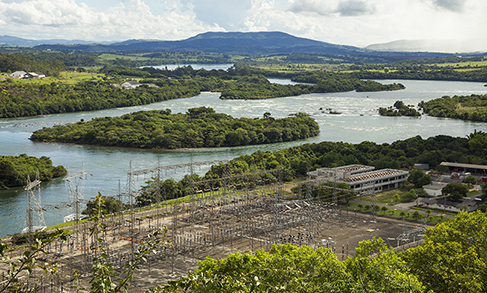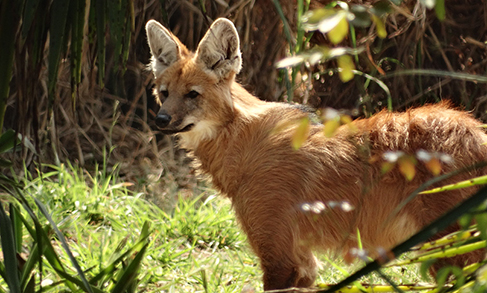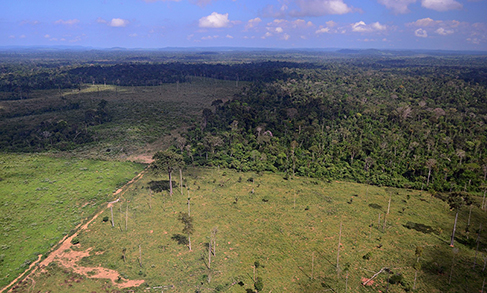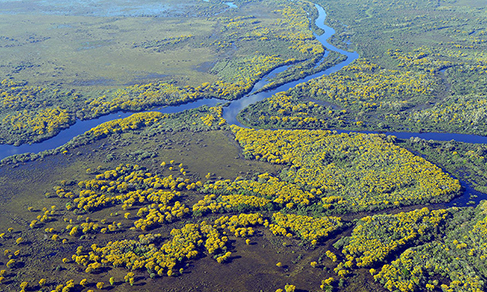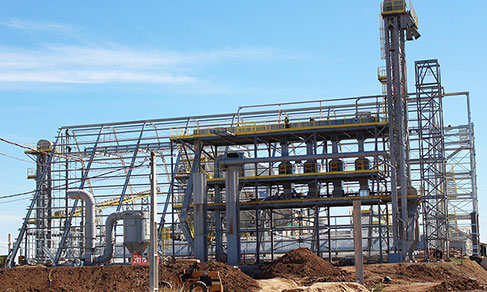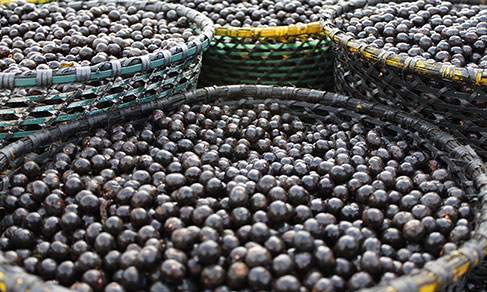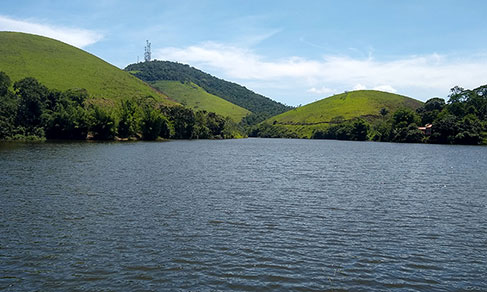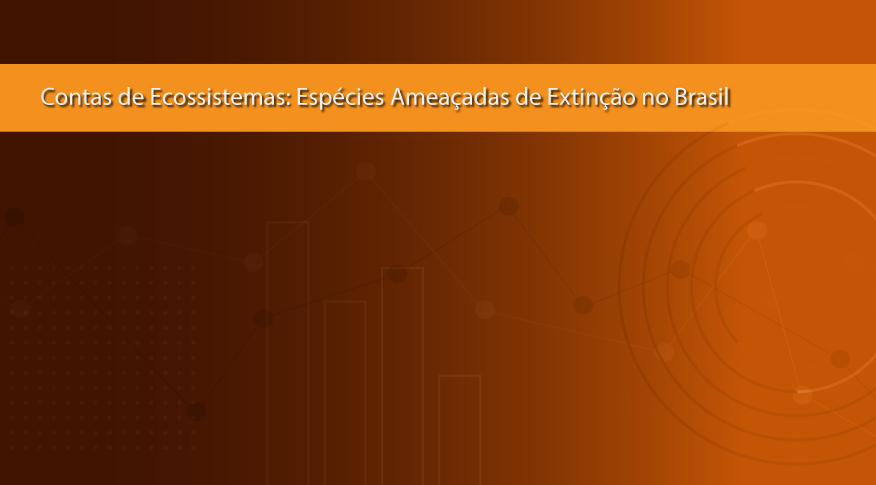Nossos serviços estão apresentando instabilidade no momento. Algumas informações podem não estar disponíveis.
Environmental-Economic Accounting
Description
The Environmental-Economic Accounting is a system of measurement and analysis, represented by a set of tables, which describes the interaction between the environment and the economy in order to give support to planning and decision making for public and business policies.
The methodology of economic and environmental accounting has been established by the United Nations through the System of Environmental-Economic Accounting - SEEA, in order to integrating economic, environmental and social data into a single statistical structure, considering also the characteristics of the country with regard to environmental, social and economic particularities and the availability of data. SEEA has eight thematic areas, including specific natural resources, such as water and energy, in addition to Ecosystem Accounting, among others. The proposed methodology for specific resource accounts is based on a central framework that accounts for the natural resources involved in the production of goods and services, establishing a relationship between the natural resources used and the income generated by different economic activities. In Brazil, the series of information on Environmental-Economic Accounting - CEA, results from a partnership between the IBGE and the National Water Agency - ANA. It began with the disclosure of results on the Environmental-Economic Accounting for Water - CEAA, covering the period from 2013 to 2015, based on the methodological recommendations in a specific manual for water: System of Environmental-Economic Accounting for Water, SEEA-Water. Ecosystem accounting, in turn, is based on the methodological recommendations contained in a specific manual: System of Environmental-Economic Accounting 2012: Experimental Ecosystem Accounting, SEEA-EEA, given the need to cross georeferenced spatial data. This methodology is being consolidated and tested by the United Nations, and the study is still called Experimental Ecosystem Accounting. The IBGE started the methodological tests for ecosystem accounting in 2017, from its participation in the Natural Capital Accounting and Valuation of Ecosystem Services (Ncaves) project - a United Nations global project, financed by the European Union which includes five countries (South Africa, Brazil, China, India and Mexico). The first results of the Ecosystem Accounting include Land Use in Brazilian Biomes, covering the period from 2000 to 2018, and the Endangered Species in Brazil, whose reference is 2014.
Currently, the accounts for water, energy, forests (wood and non-wood resources), biodiversity, ecosystem extent (ET) and ecosystem condition (EC) are being developed, tested and planned by the IBGE in partnership with specialized institutions. The geographic scope of these studies is national, with results published for different territorial sets.
 Experimental Statistics
Experimental Statistics
About the publication - 2013-2017 Valuation of ecosystem service of blue water provisioning
Natural capital accounting is an accounting structure designed to measure and compare, over time, the contribution from natural resources and from ecosystems to the social and economic aspects of a given territory, thus providing dynamic and standardized statistics for planning and decision making, aiming at more efficient and sustainable choices in the management of resources.
The IBGE acknowledges the importance of integrating environmental data into the System of National Accounts – SCN, in a way as to consider the use of ecosystem services and observe how the flow of these services in the economic system interferes with biodiversity assets. Therefore, the Institute presents, in this publication, results on valuation of ecosystem service or blue water provisioning in the activities of Abstraction, treatment and distribution of watercorresponding to division 36 of IBGE's National Classification of Economic Activities - CNAE 2.0.
Having as a reference empirical studies found in literature on the topic, the Institute adopted as a method for evaluation of environmental income the residual value approach. The results obtained are based on information from databases of the National Water and Sanitation Agency - ANA, do National Sanitation Information System - SNIS, under the responsibility of the Ministry of Regional Development, and of the System of National Accounts - SCN/IBGE, and show the potential compensation of this production factor, given the characteristics of the economic activitiy being analyzed, having as reference period years 2013 to 2017.
The study, which is also available on the IBGE website, adds to efforts towards the enforcement of international recommendations listed in the manuals System of environmental-economic accounting 2012: central framework, SEEA-CF, and System of environmental-economic accounting 2012: experimental ecosystem accounting, SEEA-EEA, developed by the United Nations, within the scope of project Natural Capital Accounting and Valuation of Ecosystem Services - Ncaves, conducted in partnership with the European Union.
It is worth of notice that the statistics released herein are experimental, that is, they are under evaluation since they have not yet reached complete levels in harmonization, coverage or methodology. Nevertheless, considering the prominent position of Brazil in the construction and development of Environmental Economic Accounting for Water - CEAA developed by the IBGE in partnership with ANA, and the potential contribution of studies about the valuation of water resources in order to discuss whether to charge for direct abstraction of blue water, this group of statistics shows that valuation based on accounting principles is possible, although other surveys in this field are still necessary to support discussion of the topic in Brazil.
 Experimental Statistics
Experimental Statistics
Concepts and methods - 2013-2017 Valuation of ecosystem service of blue water provisioning
As informações a seguir descrevem os metadados estatísticos, que são o conjunto de conceitos, métodos e aspectos relacionados às estatísticas, e são informações necessárias para compreender as características e a qualidade das estatísticas e interpretá-las corretamente.
Informações Gerais
Objetivo
Nesta publicação, o Instituto Brasileiro de Geografia e Estatística – IBGE, divulga a estatística experimental com os resultados do estudo da valoração do serviço do ecossistema de provisão de água azul utilizada pela atividade Captação, Tratamento e Distribuição de Água (CNAE 2.0 – divisão 36). Este estudo experimental parte da referência metodológica do manual System of environmental-economic accounting 2012: central framework (UNITED NATIONS, 2014a), conhecido como SEEA-CF, e, mais especificamente, do manual System of environmentaleconomic accounting 2012: experimental ecosystem accounting, conhecido como SEEAEEA (UNITED NATIONS, 2014b), os quais propõem uma avaliação integrada de informações ambientais e sua relação com a economia, o que permite uma análise combinada em uma única estrutura. As estatísticas produzidas por este trabalho são classificadas como experimentais e devem ser usadas com cautela. Estatísticas experimentais são novas estatísticas que ainda estão em fase de teste e sob avaliação. O objetivo desta publicação é envolver os usuários no desenvolvimento dessa estatística e garantir a qualidade e compreensão dos seus resultados ainda no seu estágio inicial. O Instituto coloca-se à disposição para esclarecimentos e convida usuários e pesquisadores a expressarem seus comentários e dar sugestões que venham a contribuir para o desenvolvimento das estatísticas aqui divulgadas.Tipo de operação estatística
Sistema de contas nacionaisTipo de dados
Dados agregados, IndicadoresPeriodicidade de divulgação
EventualMetodologia
Framework (CEAA-CF), os preços de mercado dos ativos ambientais podem ser
estimados através do valor presente líquido dos resource rent futuros, ou renda de recurso
ambiental.
“Por sua vez, a renda de recurso ambiental é a receita líquida da extração, definida
como receita total das vendas menos todos os custos incorridos no processo de extração,
incluindo o custo do usuário com o capital produzido. Isso significa que a renda de recurso
ambiental representa o retorno do recurso natural” (Veldhuizen et al., 2009, p. 9).
A renda de recurso ambiental pode ser estimada através do excedente operacional
bruto das atividades envolvidas na extração do recurso natural em questão, conforme
apresentado no SEEA-Central Framework (UN, 2014a):
Valor bruto de produção (Venda de ativos ambientais extraídos a preços básicos, inclui
todos os subsídios a produtos, exclui os impostos sobre produtos)
- Custos Operacionais
(i) Consumo intermediário (custos de insumos de bens e serviços a preços de
comprador, incluindo impostos sobre produtos)
(ii) Remuneração de empregados (custos de insumos de trabalho)
(iii) Outros impostos sobre a produção mais outros subsídios à produção
= Excedente operacional bruto – com base no SCNa
- Subsídios específicos à extração
+ Impostos específicos sobre a extração
= Excedente operacional bruto – para derivação de renda de recursos
- Custos de usuário de bens produzidos
(i) Consumo de capital fixo (depleção) + retorno de ativos produzidos
= Renda de Recurso Ambiental
(i) (Depleção + retorno líquido de ativos ambientais)
Assim, a renda de recurso ambiental é obtida como um resíduo que mede a
contribuição do ativo ambiental para a produção, de modo consistente com os conceitos
de Contas Nacionais.
Técnica de coleta:
Não se aplicaTemas
Temas e subtemas
Estatísticas multidomínio, Contas Nacionais, Meio Ambiente, Estatísticas macroeconômicasUnidades de informação
Unidade de investigação
Não se aplicaUnidade de análise
Não se aplica.Períodos de referência
Disseminação
Formas de disseminação
Publicação Digital (online)Nível de desagregação geográfica
NacionalSaiba mais
https://metadados.ibge.gov.br/consulta/estatisticos/operacoes-estatisticas/DV Experimental Statistics
Experimental Statistics
Publications - 2013-2017 Valuation of ecosystem service of blue water provisioning
 Experimental Statistics
Experimental Statistics
Learn more - 2013-2017 Valuation of ecosystem service of blue water provisioning
Downloads
News and Releases
Environmental-Economic Accounting for Water: Brazil
In 2020, Brazil consumes 6.2 liters of water for each R$1 generated by the Economy
In 2020, 6.2 liters of water were consumed for each real of gross value added (GVA) generated by the...
02/06/2023
Ecosystem Accounting
IBGE updates statistics on threatened species in Brazilian biomes
The IBGE released today (24) the updated data on threatened species for year 2022. This set of information...
24/05/2023
Ecosystem AccountingEnvironmental-Economic Accounting for Land
Between 2000 and 2020, agricultural area grew 230 thousand km², natural vegetation reduced 513 thousand km² in Brazil
The IBGE released today (7) the Environmental-Economic Accounting for Land: Physical Accountability,...
07/10/2022
Ecosystem Accounting
In partnership with the UN, IBGE releases integrated analysis of Ecosystem Accounts
The IBGE releases today (20) “Ecosystem Accounts: results of the NCAVES project in Brazil ”, which compiles...
20/05/2022
Environmental-Economic Accounts for Energy: products from biomass
In 2018, Brazil generated R$84 billion in energy products from biomass
In 2018, the national production of natural energy inputs from biomass was 91.3 million tonnes of oil...
09/12/2021
Environmental-Economic Accounts for Energy: products from biomass
Biomass products represented 9% of electricity in Brazil in 2018
In 2018, the production of electricity from energy products from biomass was of 54.4 thousand gigawatt-hour...
09/12/2021
Ecosystem Accounting
Experimental study estimates value of water bodies during abstraction, treatment and distribution of water
The IBGE has released today (28) Ecosystem Accounting: Value of the Ecosystem Service of Blue Water Provisioning...
28/04/2021
Ecosystem Accounting
Experimental study analyzes amount and value of non-wood forest products per biome
The IBGE has released today (15) the Ecosystem Accounts: Non-Wood Forest Products, experimental statistics...
15/04/2021
Environmental-Economic Accounting for Water: Brazil
Experimental study evaluates water conditions in Brazilian biomes
The IBGE has released today (15) Ecosystem Accounting: Condition of Water Bodies, experimental statistics...
15/04/2021
Ecosystem Accounting
In 2014, Atlantic Forest/Mata Atlântica was the biome with the highest number of species threatened with extinction
The survey “Ecosystem Accounting: Species Threatened with Extinction in Brazil”, which the IBGE releases...
05/11/2020
Errata
Correction in the publication “Ecosystem Accounting: Valuation of the ecosystem service of blue water provision 2013-2017”
Published date: 04/05/2021
Description:
Two typing errors were identified on page 26, in the title for Graph 7 and in the first paragraph, in the unit of measurement adopted in both of the cases.Actions: The file has been replaced.
Amendment in “Ecosystem accounts: land use in Brazilian biomes 2000-2018” publication
Published date: 16/10/2020
Description:
An error was pinpointed by the IBGE in the percentage data of the main conversion of land use in the Pantanal Biome. Due to a typing error, the percentage reported in the publication does not involve that in the survey´s databases.Actions: The text in the publication was changed to report the correct percentage.
Error in the release date of the publication "Ecosystem Accounting: Species Threatened with Extinction in Brazil 2014"
Published date: 02/10/2020
Description:
The IBGE identified an error for the non-compliance with the release date of the publication Ecosystem Accounts: Species Threatened with Extinction in Brazil 2014, expected to be released in October according to the calendar of geoscientific products available on the portal. Due to the COVID-19 pandemic, the release was postponed until November 05, 2020.Actions: The release calendar was changed.
Error in the release date of the publication "Ecosystem Accounting: Biodiversity and Species Threatened with Extinction, version 2014"
Published date: 28/09/2020
Description:
Error, identified by the IBGE, of non-compliance with the release date of the publication Ecosystem Accounting: Biodiversity and Biodiversity and Species Threatened with Extinction, version 2014, scheduled for September in the geoscientific products calendar on the IBGE web site. Due to the COVID-19 pandemic, its disclosure was postponed until October 16, 2020.Actions: The release date was rescheduled.
Links
Our websites:
SIDRA | Statistical Tables Database
Methodological manuals:
Manual of the System of Environmental-Economic Accoutning- Central Framework (UN)
Manual of the System of Environmental-Economic Accounting - Experimental Ecosystem Accounting (UN)
Other publications:
Ecosystems Accounts: Results of NCAVES Project in Brazil
Water Use in Rainfed Agriculture
International classification of ecosystems in Brazil
Other links:
Natural Capital Accounting and Valuation of Ecosystem Services (UN)

Estas estatísticas são classificadas como experimentais e devem ser usadas com cautela, pois são estatísticas novas que ainda estão em fase de teste e sob avaliação. Elas são desenvolvidas e publicadas visando envolver os usuários e partes interessadas para avaliação de sua relevância e qualidade. Caso deseje deixar uma crítica ou sugestão, clique aqui para deixar sua opinião.




